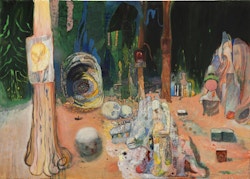Qiu Xiaofei in special installation of recent Museum acquisitions
September—December
The Metropolitan Museum of Art, New York, NY, USA
From early September until December 2025, Qiu Xiaofei's painting titled Belovezhskaya Forest (2019-2021) will be on view at The Metropolitan Museum of Art. This special presentation highlights the museum's recent acquisitions of contemporary paintings by artists of Chinese descent, including Cai Guo-Qiang and Matthew Wong.

Belovezhskaya Forest belongs to Qiu Xiaofei’s recent series investigating the intersections of personal and political history through magical realism. With influences from nineteenth-century European painting and Chinese figurative painting traditions, and forms taken after socialist architecture, Qiu lays out a fantastical, psychological drama drawing upon his family history and childhood in Harbin, in Northeastern China. The story of his maternal grandfather, a former Trotskyist whose career in China suffered due to that association, drives the narrative. Belovezhskaya Forest lies on the border of Poland and Belarus, where watershed moments during the Nazi occupation and history of the Soviet Union took place. Obscured portraits of Marx, Göring, Lenin, and Trotsky—who had direct or indirect history with the forest—are blended with Qiu’s grandfather’s visage and posted on the anthropomorphic trees. They watch over a pastel-colored figure representing a kind of arhat, one who is on the threshold toward enlightenment. Yet this character is entangled with amorphous monsters and surrounded by skulls, pointing to the forest’s sinister past. On the right and in the background appear abstracted Russian Orthodox churches and socialist-style workers’ dormitories, the latter memories from Qiu’s childhood that are slowly vanishing from the Harbin cityscape. A wormhole-like vortex, with its concentric circles, symbolizes the spiraling of time and imagination. The dizzying juxtaposition of these fragmented scenes weaves politics, allegory, and memory into a melancholy landscape.